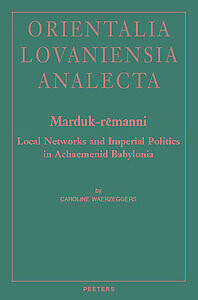
- Afhalen na 1 uur in een winkel met voorraad
- Gratis thuislevering in België vanaf € 30
- Ruim aanbod met 7 miljoen producten
- Afhalen na 1 uur in een winkel met voorraad
- Gratis thuislevering in België vanaf € 30
- Ruim aanbod met 7 miljoen producten
Zoeken
€ 105,00
+ 210 punten
Omschrijving
Marduk-remanni was a Babylonian man who lived in the provincial town of Sippar during the first decades of Persian rule in Mesopotamia (second half of the sixth century BC). His archive of c. 187 cuneiform texts was found in 1881 during excavations carried out on behalf of the British Museum, but since then it has received little attention. On first sight, the historical relevance of Marduk-remanni's records seems minimal. They relate to his private assets, business enterprises, and legal concerns - matters that barely seem to transcend the personal and local spheres. But upon closer scrutiny, it becomes clear that Marduk-remanni was at the centre of a far-flung personal network and that his life, despite his having lived far from the political centre, reflects many of the developments and changes taking place at the highest imperial level. He was a child when Cyrus the Great of Persia conquered Babylonia, and although this regime change caused little upheaval outside the political arena at first, by the time of Marduk-remanni's death several decades later, the world of his childhood had changed. His life had taken a completely different course than that of his father and grandfather. He had traveled near and far, visiting the Persian court at Susa on several occasions. No longer were the horizons of his world confined to the Babylonian heartland, as they had been for his father and grandfather. Marduk-remanni was born in provincial Babylonia, but he died as a citizen of a world empire. This book traces the social, economic and political dynamics that transformed his life.
Specificaties
Betrokkenen
- Auteur(s):
- Uitgeverij:
Inhoud
- Aantal bladzijden:
- 636
- Taal:
- Engels
- Reeks:
- Reeksnummer:
- nr. 233
Eigenschappen
- Productcode (EAN):
- 9789042930407
- Verschijningsdatum:
- 31/12/2014
- Uitvoering:
- Hardcover
- Formaat:
- Genaaid
- Afmetingen:
- 165 mm x 246 mm
- Gewicht:
- 1338 g

Alleen bij Standaard Boekhandel
+ 210 punten op je klantenkaart van Standaard Boekhandel
Beoordelingen
We publiceren alleen reviews die voldoen aan de voorwaarden voor reviews. Bekijk onze voorwaarden voor reviews.











